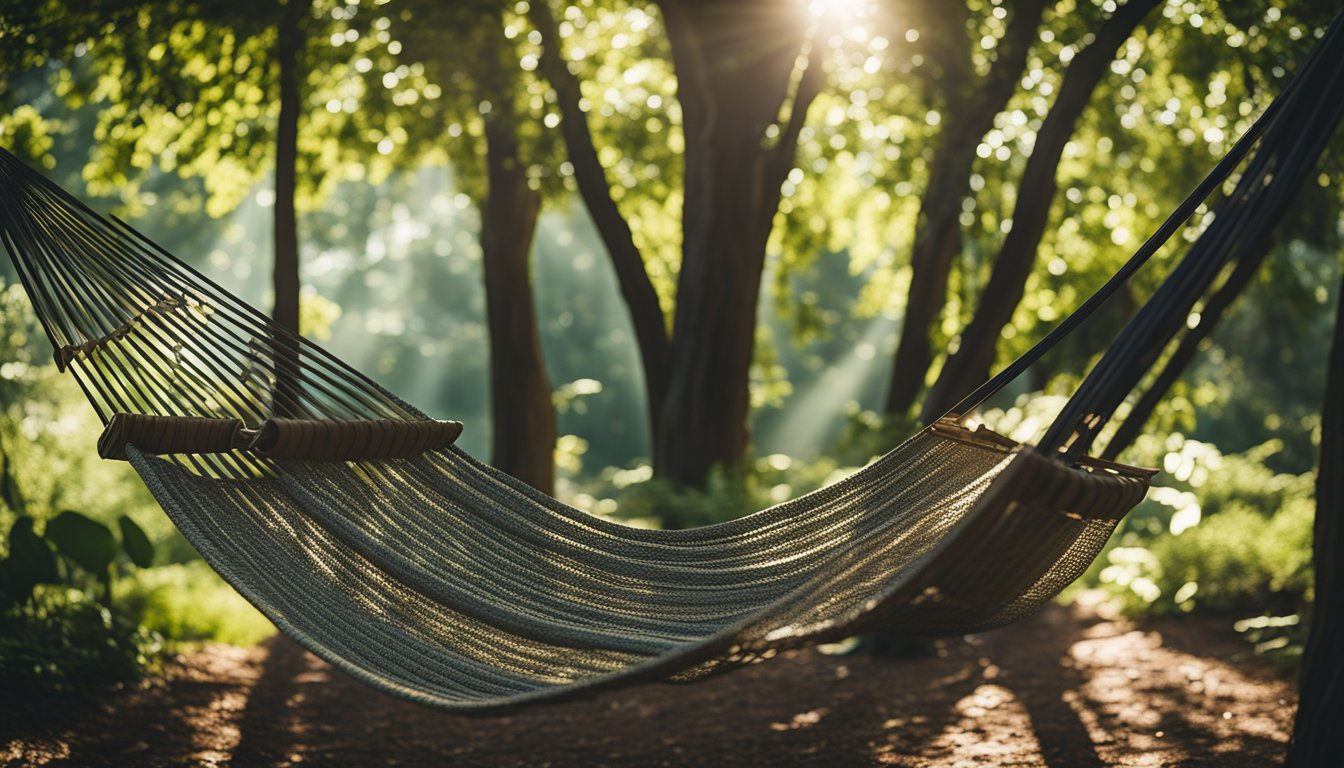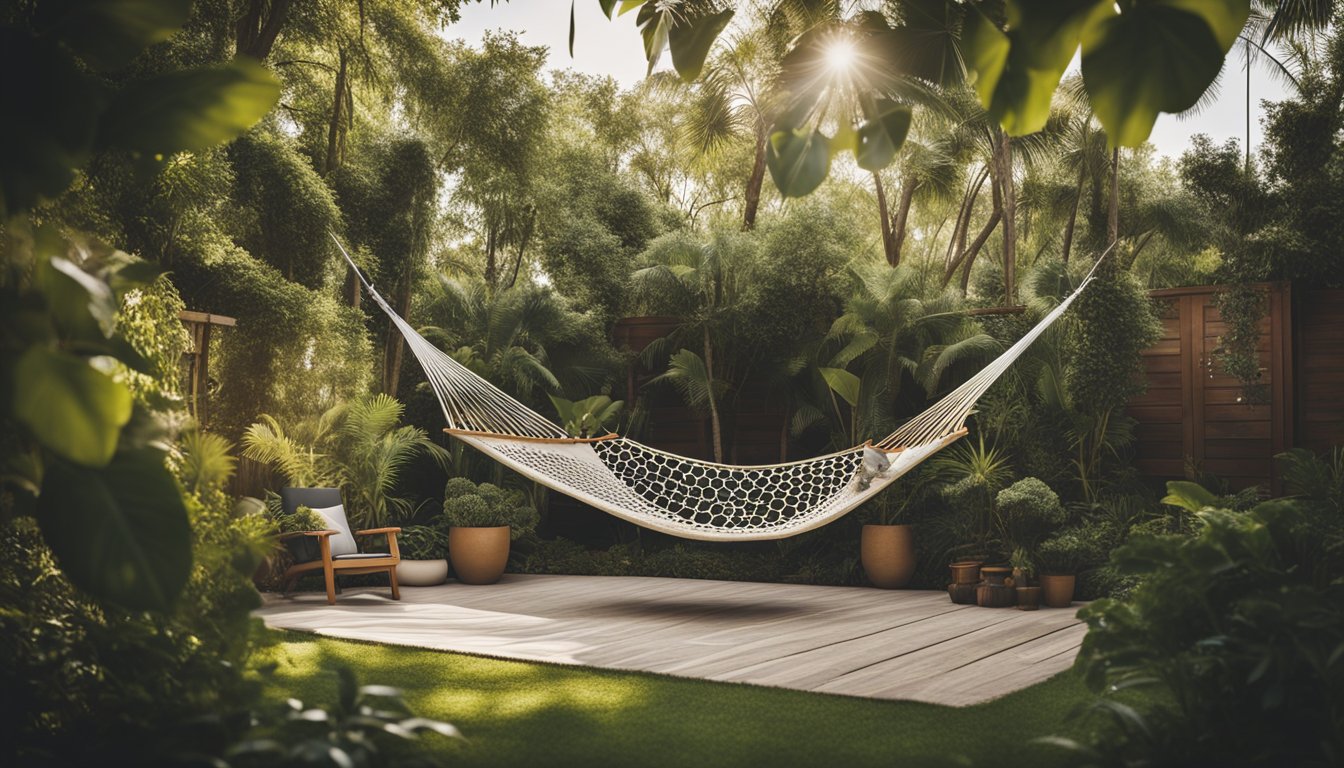Late updated: 01 May 2025 09:05
Written by: James Whitaker
Exploring Unique Backyard Hammock Concepts: Innovative Outdoor Relaxation Ideas
Creating a backyard space that serves as a sanctuary for relaxation can greatly enhance our connection to the outdoors. Exploring unique backyard hammock concepts allows us to creatively transform an average garden into a personal oasis. Whether it's for lounging under the sun or enjoying a serene spot for reading, the options are as varied as our imaginations.

Backyard hammocks come in numerous styles, from simple DIY versions to intricate designs that add a touch of luxury. By considering the layout and aesthetics of our gardens, we can select hammock ideas that blend functionality with style. This approach ensures that our outdoor space remains inviting while offering a taste of tranquillity.
Personalising a hammock setup not only elevates our garden's ambience but also caters to our specific needs for leisure and relaxation. Whether we're aiming for a tropical feel or a minimalist design, the right hammock can become an integral part of our backyard retreat, promising countless hours of comfort.
Key Takeaways
- Unique hammock ideas enhance outdoor spaces.
- Personalised designs blend style with relaxation.
- Hammock setups offer varied aesthetic options.
Fundamental Hammock Concepts for Your Outdoor Space

Creating a relaxing and stylish outdoor setting involves understanding the nuances of hammocks and their accessories. We explore the various types of hammocks, how to choose suitable stands, and the best placement for optimal comfort.
Types of Hammocks and Their Unique Uses
Hammocks come in several styles, each offering a unique experience. Rope hammocks provide excellent airflow and a classic look, making them ideal for warm climates. In contrast, fabric hammocks, often made from cotton or polyester, offer cosy and supportive seating great for cooler evenings. For shared enjoyment, a double hammock is perfect as it accommodates multiple people. Chair hammocks provide compact and upright seating, suitable for smaller spaces.
Materials are crucial. Cotton feels soft and breathable but can wear out faster if left exposed to the elements. Polyester is more durable and weather-resistant. Our choices should align with our specific needs and the conditions of our outdoor space to maximise relaxation and style.
Choosing the Right Hammock Stand and Set
Selecting a proper hammock stand ensures stability and convenience. Metal stands are sturdy and weather-resistant, often adjustable to different hammock types. Wooden stands add a natural elegance that complements outdoor settings but require maintenance to withstand weather effects. For permanent fixtures, concrete posts provide durable support.
A complete hammock set, which includes the hammock and a compatible stand, simplifies setup. It's vital to ensure the stand is rated for the hammock’s weight capacity and size. Consider the ease of assembly and disassembly, particularly if the hammock will be stored during off-seasons.
Optimal Placement for Relaxation and Lounging
The location we choose for our hammock significantly impacts our lounging experience. Shady spots shielded from direct sunlight can enhance comfort and extend the hammock's lifespan. Proximity to nature, like trees or a garden, enhances the ambience, creating a peaceful retreat.
It's essential to ensure the area is flat and stable to prevent any accidents. Privacy and quietude are important as they foster an environment conducive to relaxation. Spaces near water features like ponds or fountains can add soothing soundscapes, creating the ultimate backyard oasis.
Distinctive Backyard Hammock Inspirations
Incorporating hammocks into our outdoor living spaces offers unique relaxation opportunities. This section highlights ideas like integrating nature with our hammock setups, creating enchanting atmospheres, using hammocks for social gatherings, and exploring portable options for our camping adventures.
Integrating Greenery and Water Features
We can transform hammocks into tranquil retreats by integrating them with lush greenery and soothing water features. A hammock nestled amid diverse plants and hanging foliage adds an element of natural beauty.
Utilising water features such as small fountains or ponds enhances serenity, offering gentle sounds that promote relaxation. Positioning hammocks near these features allows us to enjoy nature's symphony while lounging. This approach not only provides comfort but also seamlessly blends our hammock area into the surrounding landscape.
Elevating Ambience with String Lights
String lights are an effective way to elevate the ambience of our hammock spaces. They create a warm and inviting glow, perfect for evening relaxation or gatherings. Draping string lights overhead or wrapping them around nearby trees and structures enhances visual appeal.
We can choose from solar-powered or plug-in lights depending on outdoor setups. By playing with light placement and intensity, it's possible to tailor ambience for any occasion, from intimate evenings to festive gatherings.
Hammocks for Entertaining and Al Fresco Dining
Hammocks aren't just for solitary relaxation; they can be central to entertaining guests and enjoying al fresco dining. Consider arranging multiple hammocks around a central garden table or fire pit. This setup encourages conversation and creates an informal space for guests to unwind.
We can accompany this arrangement with cushions and throws to enhance comfort. Hammocks introduce a relaxed vibe, making outdoor dinners or gatherings truly memorable. Our garden becomes a haven for delighting friends and family amidst nature.
Portable Hammock Concepts: Camping and Backpacking
For those fond of camping or backpacking, portable hammock concepts offer versatility and comfort. Lightweight and easy to set up, portable hammocks work as practical alternatives to tents. They can be hung between trees, providing a raised sleeping surface that helps avoid ground moisture.
Many portable hammocks come with additional features, such as integrated mosquito nets and waterproof covers, ensuring a cosy and sheltered sleep under the stars. By choosing materials that balance durability with lightweight convenience, our hammocks become indispensable companions for any camping trip.
Frequently Asked Questions

Our exploration into backyard hammocks covers innovative design features, space-saving integration, weather-resistant materials, and safety tips. We also discuss how style choices affect relaxation and ways to accessorise for added functionality and aesthetics.
What innovative design features enhance the comfort and utility of backyard hammocks?
Incorporating spreader bars can keep the hammock flat and stable, providing more comfort. Built-in pockets offer storage, making it convenient to keep essentials close. Some hammocks come with mosquito netting or adjustable canopies, enhancing their utility by providing protection from insects and varying weather conditions.
How can one integrate a hammock into a small garden without compromising space?
We can utilise vertical space by using wall-mounted hammocks or those that attach to existing structures like pergolas. Hanging chair hammocks take up less floor space and offer a cosy spot without dominating the garden. Selecting lightweight, foldable designs allows us to stow the hammock away when not in use, freeing up space for other activities.
What are the best weather-resistant materials for outdoor hammocks in variable climates?
Materials like polyester and olefin are outstanding for outdoor hammocks due to their resistance to moisture and UV rays. Our choice might also include quick-drying fabrics, which prevent mould and mildew. Cotton blends offer comfort but require more care to maintain their durability in outdoor settings.
What safety considerations should be taken into account when installing a hammock?
We must ensure the supports are sturdy enough to hold the hammock's weight, choosing anchor points that are durable and weather-resistant. Using high-quality suspension systems reduces the risk of failing. It’s important to maintain adequate clearance from the ground and surrounding structures to prevent accidents.
How does the choice of hammock style influence the relaxation experience?
Rope hammocks provide a breezy experience, ideal for hot days. On the other hand, quilted hammocks offer extra cushioning, suitable for cooler evenings. By choosing hammocks with built-in stands, we enhance flexibility in positioning, allowing us to follow the sun or shade as desired.
What are the creative ways to accessorise a hammock for added functionality and aesthetics?
Adding pillows and blankets increases comfort and introduces personal style. We can incorporate string lights around the hammock area to create a cosy atmosphere at night. Using weatherproof cushions and detachable cup holders enhances convenience and invites longer, more relaxing lounge sessions in our outdoor space.
